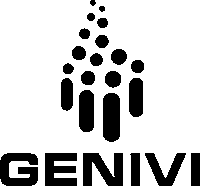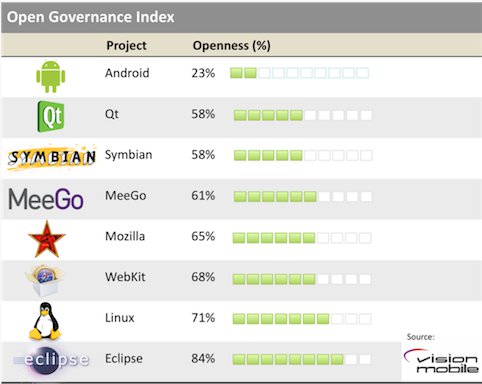Tizen, a new Linux based HTML5 operating systems aimed at mobile and consumer devices, was announced at the end of September 2011 without much detail. Today, Tizen has posted a set of pre-release tools, source code and related documentation to give application developers an early look at Tizen. Tizen Alpha (pre-1.0) is a very early preview and is not yet designed for use to create production applications. They specifically released the following items: Tizen source code preview – Operating system source code, including middleware, basic UI, and menu interface Tizen SDK preview – SDK & APIs: Web IDE, Emulator, Web API documentation, and Toolchain If you plan to try Tizen SDK, you development machines should match or exceed the following requirements: Ubuntu 10.04/10.10/11.04 32-bit (Windows and Mac version will be available later) At least dual-core 2 GHz CPU (recommend VTx supported by CPU) At least 2 GB of RAM memory […]
Tizen: Linux Based OS with HTML5 Application Programming Interfaces
Earlier this week, the Linux Foundation announced yet another new Linux-based open source operating system for mobile and consumer devices based on Web standards called Tizen. This project is backed by Intel and Samsung who have already been involved with Linux based operating systems before, respectively with MeeGo and Bada. Both companies will be part of the technical steering team. It looks like Tizen will replace Meego overtime. Meego developers blasted the move and posted angry comments especially in relation to Qt support and the fact that all the previous work put into the project has probably gone to waste. My take is that using HTML5 is probably not such a bad ideas as many applications are currently developed in HTML5/Javascript for Chrome Webstore for example, and it could make porting those to Tizen straightforward. Tizen will support multiple device categories including: Smartphones Tablets Smart TVs Netbooks In-vehicle infotainment devices […]
LinuxCon 2011 Presentation: Embedded Systems
The fourth presentation entitled “Embedded Systems” was presented by Tim Harder, developer at OSUOSL (Oregon State University Open Source Lab) on the 16th of August 2011 at LinuxCon 2011. Abstract: This presentation deals with software development for Embedded Systems especially focusing on Linux and open source. It describes current software development challenges such as fast software life cycle and memory footprint issues, lists several open hardware projects (Beagleboard, Pandaboard, Bug Labs, Gumstix), microcontrollers (Arduino and TI MSP430), different operating systems (Android, Meego) and toolchain build tools (Buildroot, Yocto) for embedded systems. It also explains specific challenges to embedded software development such a the numerous number of hardware platforms and software & hardware tools. Finally, it deals with the cross-compilers, emulators (e.g. qemu) and debugging tools (gdb, jtag, serial console, etc…). If you want to download the presentation slides, please go to Embedded Systems and use the download button on top of […]
Bootloader to OS with Unified Extensible Firmware Interface (UEFI)
Unified Extensible Firmware Interface (UEFI) is a specification detailing an interface that helps hand off control of the system for the pre-boot environment (i.e.: after the system is powered on, but before the operating system starts) to an operating system, such as Windows or Linux. UEFI aims to provides a clean interface between operating systems and platform firmware at boot time, and supports an architecture-independent mechanism for initializing add-in cards. UEFI will overtime replace vendor-specific BIOS. It also allows for fast boot and support for large hard drives (> 2.2 TB). There are several documents fully defining the UEFI Specification, API and testing requirements: The UEFI Specification (version 2.3.1) describes an interface between the operating system (OS) and the platform firmware. It describes the requirements for the following components, services and protocols: Boot Manager Protocols – Compression Algorithm Specification EFI System Table Protocols – ACPI Protocols GUID Partition Table (GPT) […]
What is GENIVI ? A Software Standard for the Automotive Industry
I’ve recently read in the news that a few operating systems had achieved GENIVI compliance. So let’s see what Wikipedia says about the GENIVI Alliance: The GENIVI Alliance was founded on March 2, 2009 by BMW Group, Delphi, GM, Intel, Magneti-Marelli, PSA Peugeot Citroen, Visteon, and Wind River Systems with the goal of establishing a globally competitive, Linux-based operating system, middleware and platform for the automotive in-vehicle infotainment industry. Since then, the alliance has expanded to more than 100 members who are working together to deliver an open and globally consistent software platform based on Linux for use by the whole car industry. So the clear goal here is to have some set of software specifications and standards (Currently GENEVI 1.0) in the automotive industry in order to speed time to market and reduce the cost of developing Infotainment applications. GENIVI comes from a concatenation of Geneva and IVI (In-Vehicle […]
Android Scores Last in Open Governance Index
Vision Mobile recently released a report about different open source projects analyzing their openness via their Open Governance Index. The full report (45-pages) examines: Open source cultural roots and working upstream vs downstream Open source licenses vs governance models Analysis and classification of governance models In-depth reviews of Android, Qt, Symbian, MeeGo, Mozilla, WebKit, Linux and Eclipse Best practices in creating an open source project The governance index is not only based on the percentage of source code that is open, but on the whole software development including the transparency of the decision making-process, the involvement of the community in all aspects of the project, compliance requirements and more. There are a total of 13 metrics accross 4 area of governance: Access: availability of the latest source code, developer support mechanisms, public roadmap, and transparency of decision-making Development: the ability of developers to influence the content and direction of the […]
Linaro Development Board “Snowball” by ST Ericsson
ST Ericsson unveiled a development board based on Nova A9500 (dual ARM Cortex A9 processor and MALI 400 GPU) at MWC 2011 called Snowball (or SKY-S9500-ULP-CXX) for the embedded Linux community and professional developers. This board was designed by CALAO Systems and can be pre-ordered on their website for 200 USD (SKY-S9500-ULP-C11 / Software Development Kit – SDK) or 300 USD (SKY-S9500-ULP-C01 / Production development Kit – PDK). The difference between the SDK and PDK is that the former has no expansion connectors, no battery backup for RTC and only support serial over USB port (for Linux console). First, some pictures with description of the snowball development board. The full documentations for Snowball development board can be found in Calao Systems File Repository, where you’ll get the bottom and top assembly diagrams for both C01 and C11, the major components datasheet, documentation and some photos. The specifications of the boards: – […]








